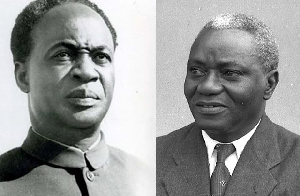• He was arrested with some other persons over an alleged plot against Kwame Nkrumah
• J.B. Danquah died in prison on February 4, 1965
Dr. Joseph Boakye Danquah, Joe Appiah, Patrick Quaidoo and other prominent opposition personalities and leaders of the railways workers strike movement, were arrested on October 3, 1961 under the Preventive Detention Act.
The arrest came after an alleged coup plot to murder then President Kwame Nkrumah and other ministers was discovered.
According to details of the events by ghanaianmuseum.com, a strike action which involved several thousands of railways, dock and other workers at the time, broke out on September 4, 1961 at the twin towns of Takoradi-Sekondi, subsequently spreading to Accra and Kumasi.
The nationwide strike was in protest of the government’s compulsory savings scheme and price increase in commodities such as sugar, flour and other items which were key to the living standards of workers.
The worker-led movement brought the country’s rail system to a halt, forcing many workers to lay down their tools. During the heated time, there were various appeals by government and the Ghana Trades Union Congress for a resumption of services but that proved unsuccessful.
During the strike action, some employees of trading firm, A.G. Leventis and Co., which was backed by government loans were also affected.
On September 9, 1961, a limited state of emergency was proclaimed, covering both the area of Takoradi and Sekondi and the country’s railway system.
This measure gave the government power to restrict movement of vehicles and essential supplies, control traffic and ban meetings of saboteurs.
The state further imposed a conviction of saboteurs, who when found culpable, will be liable of facing up to 10-years in prison. Senior police or military officers were also empowered to detain suspects without a warrant.
Meanwhile, when Kwame Nkrumah returned to Accra on September 16, 1961 from his nine-week holiday in the Soviet Union, he revoked the state of emergency and appealed to all persons involved in the strike to return to work immediately.
Despite a few returning to work a week after Nkrumah’s appeal, many still did not return to work until September 22, 1961.
Shortly after, Nkrumah yet again appealed to all workers to return to work but many still refused. He later denounced the strike action as ‘subversive and illegal’
President Kwame Nkrumah later on September 28, 1961, despite many workers still refusing to return work, announced he had directed six members of his government, including two Cabinet ministers, to resign in view of the varied business connections.
The two Cabinet ministers were K. A. Gbedemah and Kojo Botsio.
All six members of Nkrumah’s government subsequently accepted the request to resign and surrender portions of their assets to the State.
Two days later, President Nkrumah, carried out what was described as an ‘extensive and necessary governmental reorganization’. This saw the arrest and detention of several prominent members of the opposition party at the time.
Known as the Preventive Detention Act, J.B. Danquah and alleged leaders of the strike movement were arrested on October 3, 1961 over their involvement in the plot to murder the president and sow discontent in the country.
J.B. Danquah who was arrested along with others, was the 1960 presidential candidate of the United People Party. The other members were Joe Appiah, a deputy leader of the party and Patrick Quaidoo, who was a member of Dr Kwame Nkrumah’s cabinet until May 1961.
The government on its part, stated the arrests were carried out following the uncovering of several subversive activities, including a plot to murder Dr. Nkrumah and other ministers and to overthrow the regime.
Some other four arrested members of parliament subsequently had their seats in house revoked with by-elections held in their respective constituencies.
The move was based on the grounds that the MPs had automatically lost their seats as a result of the detention orders issued against them.
The government later on October 7, 1961, announced its intention to issue a White Paper providing full details leading up to the arrests.
J.B. Danquah later died in prison on February 4, 1965
Source: www.ghanaweb.com
 Home Of Ghana News Ghana News, Entertainment And More
Home Of Ghana News Ghana News, Entertainment And More





